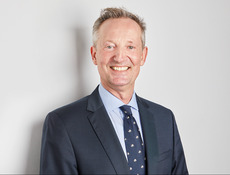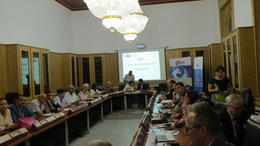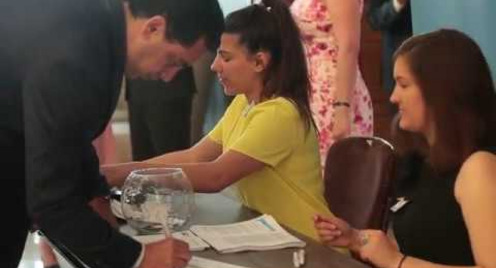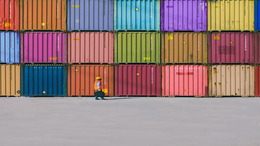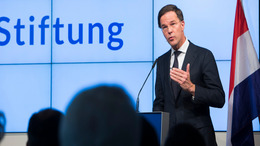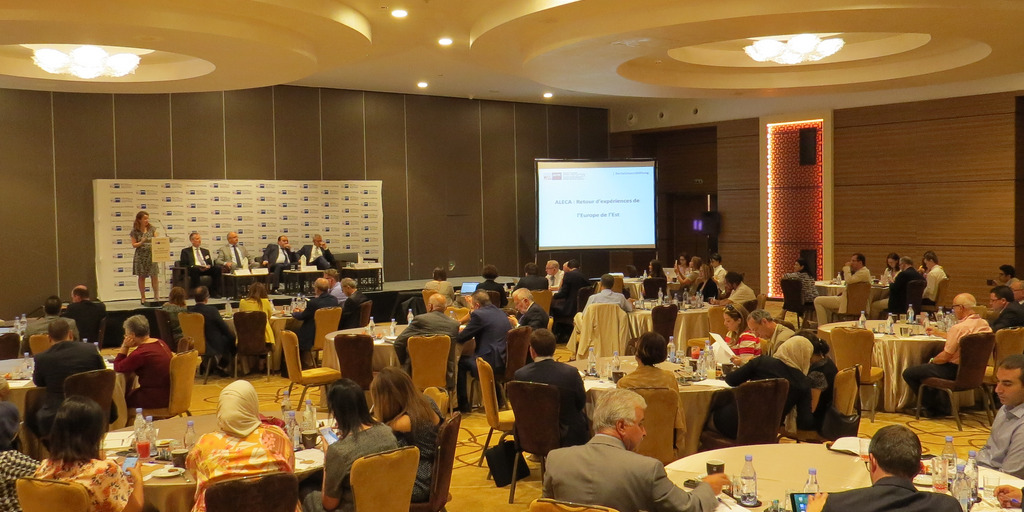
Sonja Miekley / AHK Tunesien
Tunisia and Eastern Europe: Peer Learning in Reform Policymaking
Tunisia is negotiating for more integration with Brussels. Ukraine, Georgia and the Republic of Moldova see closer economic and legal ties to the EU as an opportunity to advance structural reforms in their respective countries. Engaging with each other in direct discussion over these issues has highlighted the different paths forward.
For its part, Tunisia has been in talks with Brussels since 2015 that aim to deepen its economic integration with the EU, though this has been a matter of debate among political, economic and civil society leaders. Whereas some see the opportunities ALECA presents – modernization and economic growth that brings new jobs and improved products for consumers at lower prices –others fear that Tunisian businesses will suffer at the hands of a more open market or as a result of changes in regulations.
Over the last two to four years, Georgia, the Republic of Moldova and Ukraine have each established Deep and Comprehensive Free Trade Agreements with the EU, which are referred to in French in Tunisia as “ALECA”, Accord de Libre Échange Complet et Approfondi.
At the request of Tunisian stakeholders, the Bertelsmann Stiftung’s “Europe’s Future” program set up a delegation that includes three former negotiators for the so-called DCFTA3, Georgia, Moldova and Ukraine, and independent experts from think tanks in each of these countries. This delegation of practitioners and experts shared their experiences and observations in a series of working sessions featuring government representatives and negotiating teams, at public events, and at roundtable discussions with civil society organizations and key associations, such as unions, employers’ associations and those representing the classical "liberal” professions such as education and media. These forums of exchange were held in locations as diverse as the capital city of Tunis to the more provincial town of Sfax in the south, thereby sending an important signal in a country where many regions feel they are at an economic and social disadvantage vis-á-vis Tunis.
Given inflation, costs and the state of Tunisia’s public debt are increasing and unemployment among youth is high – there’s no doubt about the need for both economic and social reforms in the country. And thanks to its post-revolutionary openness, the entire country – from parliament to the media to civil society – is engaged in debates for and against reforms and relations with the EU.
But what is the right way forward in generating more prosperity for all Tunisians?
The European Union’s strategy involves underpinning prosperity with a more liberal society and economic modernization which, in turn, brings greater stability and security – also for Europe. Indeed, economic integration with the EU single market unlocks the potential held captive by sclerotic economic structures, bringing investments and other opportunities for greater productivity and job growth.
For the EU’s eastern neighbors Georgia, Moldova and Ukraine, the logic of this strategy is convincing – despite or perhaps because of the difficult political and economic conditions they each face. The democratically elected governments in these countries see deepening economic integration into the EU above all as an opportunity to advance broadscale modernization at home and to emancipate from Russia. Their initial experience with this process has demonstrated that they have a lot to catch up on, if they are to compete internationally. Some companies have failed and jobs lost. At the same time, other branches have thrived and new jobs have been created. This positive balance of trade with the EU is not the only encouraging development. Georgia in particular is leveraging its geographical location – and the challenges associated with it – to serve as a European-oriented hub for China and India.
"We repeatedly asked European Commission representatives how we might interpret specific formulations provided for in the agreement and the extent of their reach so that we could determine what advantages they bring for we Georgians." - Former Adviser to the Georgian Chief Prosecutor's Office Tamara Kovziridze, adressing Tunisian negotiators during a meeting at the office of the Tunisian prime minister on June 26, 2018.
As Adrian Lupusur from Moldova stated: “Every reform has its winners and losers. We need to identify potential losers and minimize their costs. But it's important to differentiate between those that are not competitive because of structural problems and those who aim to protect their specific interests and monopolies."
What have the Tunisians drawn from their exchange with the East Europeans?
As a result of their individual political and economic systems and the specifics of their cultural and geographic contexts, Georgia, Moldova and Ukraine have taken very different paths forward. Ukraine has undergone two revolutions and each country’s economy has performed poorly, as the losses registered by state-owned enterprises in Ukraine show. According to the experts, none of these countries currently have much of a chance of joining the EU. Nonetheless, the DCFTA3 sees within the process of deepening economic and legal integration with the EU an opportunity to advance key structural reforms in their countries. Each country has leveraged the opportunities offered by the EU to, for example, pursue a flexible liberalization of their markets and to reach agreements on transitional periods for specific economic sectors. Harmonizing regulations and standards in particular involves a considerable time investment and resources.
As Valeriy Piatnitskiy from Ukraine says: “We went down a path far removed from the EU’s initially documented recommendation. By the end of the four years of negotiation, we had an entirely different agreement.”
What do the East Europeans have to say, looking back? What could they have done better?
Political leadership should involve from the start society and business in an open, intensive debate in order to develop a vision for the country and its key economic sectors. These ambitions should underpin reform planning and implementation. ALECA and other forms of economic integration with the EU are no substitute for a country’s individual reform strategy and action plans that are tailored to its specific needs. And yet they must be coordinated so as to not undermine each other. The success of even the most advantageously negotiated agreement depends on its implementation. This conclusion is confirmed by a joint 2016 study from the Bertelsmann Stiftung and the Vienna Institute for International Economic Studies: "Benefits and Costs of DCFTA".
One of the benefits of developing stakeholder networks within the European Neighbourhood involves the serendipitous emergence of bold new ideas. While visiting a Tunisian family-run food product operation in Sfax, former Ukraine Chief Negotiator Valery Piatnitskyi suggested: “Why don't you buy sugar from Ukraine and sell us your fantastic olive oil!”
This initiative has been conceived and organized by Eastern Europe expert Miriam Kosmehl and the Bertelsmann Stiftung's Middle East expert Christian Hanelt, together with the Tunisian-German Chamber of Industry and Commerce in Tunis.
